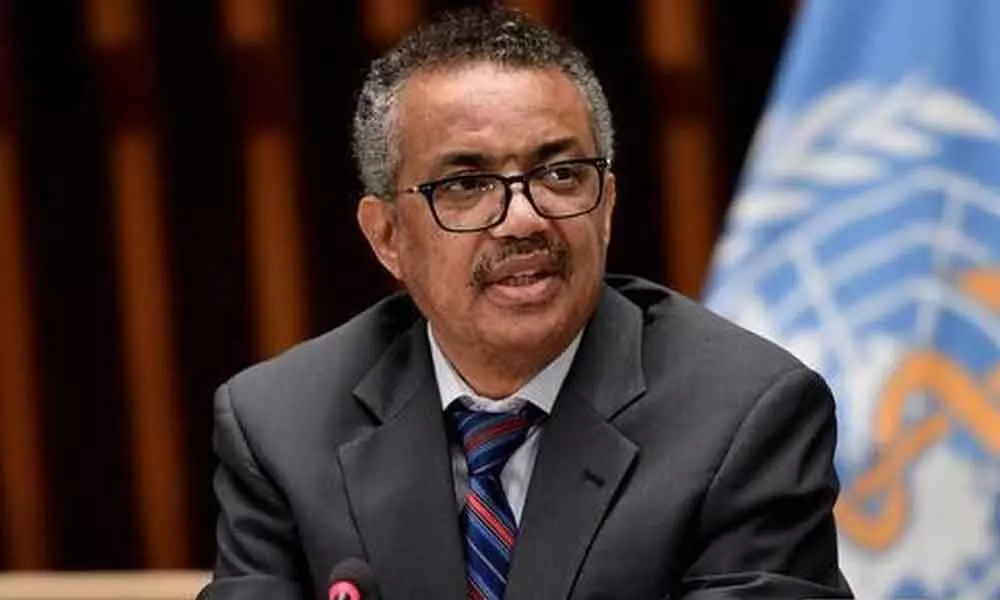Live
- They always want me to win, and now I feel lucky to have been offered a story like ‘Zebra’: Satyadev Kancharana
- ‘Democracy first, humanity first’: PM Modi in Guyana's parliament on two countries' similarities
- PKL Season 11: Telugu Titans register third straight win to top standings
- Is Pollution Contributing to Your COPD?
- NASA Unveils Underwater Robots for Exploring Jupiter's Moons
- Additional Central forces arrive in violence-hit Manipur
- AR Rahman and Saira Banu’s Divorce: Legal Insights into Common Issues in Bollywood Marriages
- 82.7 pc work completed in HPCL Rajasthan Refinery area: official
- Curfew relaxation extended in 5 Manipur districts on Friday
- Tab scam prompts Bengal govt to adopt caution over fund disbursement
Just In
WHO to set up centre for traditional medicine in India; matter of pride: Modi


WHO Director General Tedros Adhanom Ghebreyesus
‘Traditional medicine such as Ayurveda can play an important role in integrated people-centric health services’
New Delhi: The World Health Organisation announced on Friday that it will set up a Global Centre for Traditional Medicine in India, with Prime Minister Narendra Modi expressing confidence that just like the country has emerged as the 'pharmacy of the world', the WHO institution will become the centre for global wellness.
WHO Director General Tedros Adhanom Ghebreyesus made the announcement in a video message at an event in which Prime Minister Modi dedicated two future-ready Ayurveda institutions in Jaipur and Jamnagar to the nation via video conferencing on the occasion of the 5th Ayurveda Day.
The Institute of Teaching and Research in Ayurveda (ITRA), Jamnagar (Gujarat) and the National Institute of Ayurveda (NIA), Jaipur (Rajasthan) are both premier institutions of Ayurveda in the country. The Jamnagar institute has been conferred the status of an Institution of National Importance (INI) by an act of Parliament and the one at Jaipur has been designated an Institution Deemed to be University (De novo Category) by the University Grants Commission (UGC), according to the AYUSH ministry.
"This new centre will support WHO's efforts to implement the WHO traditional medicine strategy 2014-2023 which aims to support countries in developing policies and action plans to strengthen the role of traditional medicine as part of their journey to universal health coverage and a healthier, fairer and safer world," Ghebreyesus said.
Traditional systems of medicine such as Ayurveda can play an important role in integrated people-centric health services and healthcare, but they have not received enough attention, the WHO DG said. Ghebreyesus also lauded Prime Minister Modi for his commitment to the universal coverage under Ayushman Bharat and evidence-based promotion of traditional medicines to achieve health related objectives.
Modi said Ayurveda is India's heritage whose expansion entails the welfare of humanity and all Indians will be happy to see that the country's traditional knowledge is enriching other countries. "It is a matter of pride for all Indians that the WHO has chosen India for establishing its Global Centre for Traditional Medicine. Now work will be done in this direction from India," Modi said.
"I would like to thank the WHO and particularly its Director General Tedros for giving this responsibility to India. I am confident that just like India has emerged as the pharmacy of the world, in the same manner this centre for traditional medicine will become the centre for global wellness," he said.
Stressing on bringing ayurveda knowledge out of books, scriptures and home remedies and developing this ancient knowledge as per modern needs, Modi said new research is being done in the country by combining information received from modern science of the 21st century with India's ancient medical knowledge. Noting that three years ago, the All India Ayurvedic Institute was established here, he said Ayurveda is not just an alternative today but one of the key basis of the country's health policy. Modi informed that work is on to develop the National Sowa-Rigpa Institute for research and other studies related to Sowa-Rigpa in Leh. The two institutions in Gujarat and Rajasthan which have been upgraded are also an extension of this development, he added. Congratulating the two institutes for their upgradation, the prime minister pointed out that they have more responsibility now and hoped that they will prepare syllabus for Ayurveda which meets international standards.

© 2024 Hyderabad Media House Limited/The Hans India. All rights reserved. Powered by hocalwire.com






